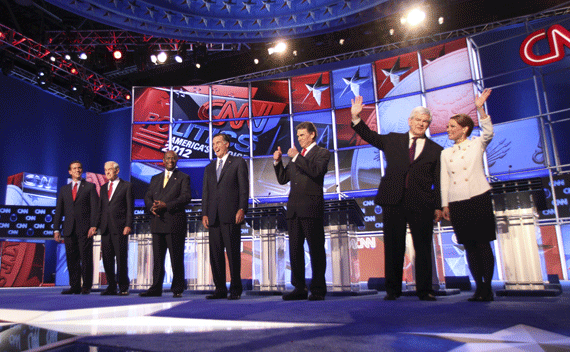Defense, Foreign Aid, and the Las Vegas Debate
More on:

I like political debates. They offer candidates a chance to discuss important issues, and with a bit of luck, help educate the public about the tough choices that the country faces. But sometimes candidates dodge questions and tell people what they want to hear rather than what they need to know. That was the case when Tuesday night’s GOP presidential debate turned to foreign policy.
The first foreign policy question was a good one. An audience member asked whether the candidates supported “the deficit reduction measure to cut defense spending by $500 billion.” Here was a golden opportunity to get an answer to the great unasked question of the campaign: How exactly will the GOP candidates (with the exception of Ron Paul) possibly make good on their promise to maintain (or in Mitt Romney’s case, increase) current levels of defense spending, hold the line against tax increases, and still balance the federal budget?
Alas it remains the great unasked question. Michele Bachmann got the first shot at an answer and talked about Iran. Newt Gingrich labeled himself a “cheap hawk” and railed about the super-committee process. Ron Paul said he would cut military spending. After a quick Twitter-inspired question about whether Herman Cain would negotiate with terrorists, Rick Santorum said he “would absolutely not cut one penny out of military spending.” Moderator Anderson Cooper could have asked if Paul was right that deep cuts in defense spending are unavoidable if the United States is to put its fiscal house in order, especially if tax increases are off the table. He didn’t.
The conversation got even less illuminating when another audience member asked “why do we continue to send foreign aid to other countries when we need all the help we can get for ourselves?” Now it is probably too much to expect presidential candidates, especially Republican ones, to pound the lectern defending foreign aid during campaign season. But they can talk sensibly about the issue, acknowledging voter concerns while explaining that foreign aid serves important U.S. interests.
That isn’t what happened Tuesday night. Instead, Rick Perry went first and answered:
I think it’s time for this country to have a very real debate about foreign aid. Clearly, there are places—as a matter of fact, I think it’s time for us to have a very serious discussion about defunding the United Nations. When you think about—when you think about the Palestinian Authority circumventing those Oslo accords and going to New York to try to create conflict and to have themselves approved as a state without going through proper channels, it is a travesty. And I think it’s time not only to have that entire debate about all of our foreign aid, but in particular, the UN. Why are we funding that organization.
Why Perry thinks that the UN should be punished because Palestinians asked to be recognized as a state isn’t exactly clear. The Security Council hasn’t acted on the request, and it won’t because the United States will veto any resolution to recognize a Palestinian state.
What was most notable about Perry’s statement, however, was that none of his rivals challenged him. Now granted, there’s a lot to dislike about the UN. But the fact is that if it didn’t exist we’d invent it. (Heck, we did invent it.) Why? Because it is a useful venue for furthering American interests. Sanctions against Iran is the most recent and obvious example. And any decision to defund the UN would deeply damage the credibility of American global leadership, the one thing that all the GOP candidates, again with the exception of Ron Paul, insist that Barack Obama has surrendered and that they intend to restore. Not even our closest allies would follow Washington in abandoning the UN.
But again, none of the other GOP candidates wanted to make the case for the UN. Mitt Romney even seemed to want to one-up Perry, implying that he would do away with humanitarian aid:
I happen to think it doesn’t make a lot of sense for us to borrow money from the Chinese to go give it to another country for humanitarian aid. We ought to get the Chinese to take care of the people that are—that are—and think of that borrowed money (today?).
The same could be said, of course, about any federal expenditure, including the two items the audience heartily cheered, defense spending and aid to Israel.
It was especially odd to hear Romney criticizing humanitarian aid. He is after all the candidate who in describing his approach to foreign policy says he intends to apply “the full spectrum of hard and soft power to influence events before they erupt into conflict.” A Washington that turns its back on humanitarian aid will have a lot less soft power to wield.
Again, it is hardly a surprise that the candidates didn’t do justice to the questions they were asked. It is, however, disappointing. I’ll just keep my fingers crossed that when the candidates meet again on November 15 for their national security debate that they grapple with the complexity of the many foreign policy challenges that the United States faces. They would be doing the country a great service.
More on:
 Online Store
Online Store